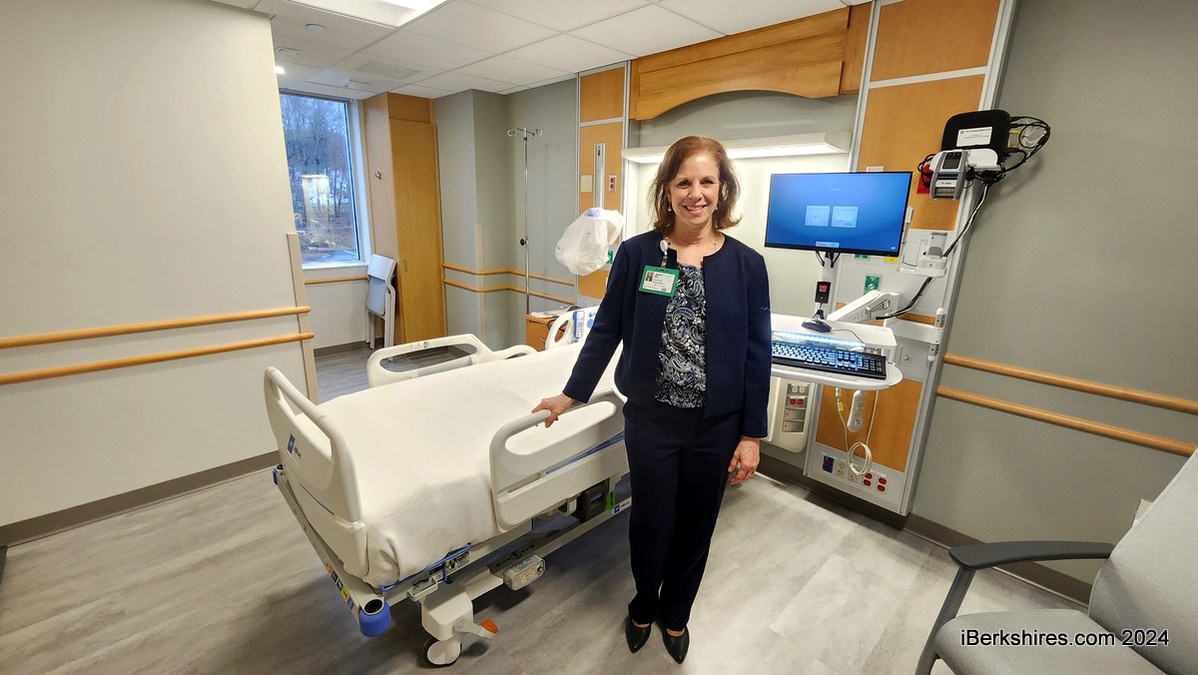
President and CEO Darlene Rodowicz poses in one of the new patient rooms on 2 North at North Adams Regional Hospital.
NORTH ADAMS, Mass. — On March 28, 2014, the last of the 500 employees at North Adams Regional Hospital
walked out the doors with little hope it would reopen.
But in 2024, exactly 10 years to the day,
North Adams Regional was revived through the efforts of local officials, BHS President and CEO Darlene Rodowicz, and U.S. Rep. Richard Neal, who was able to get the U.S. Health and Human Services to tweak regulations that had prevented NARH from gaining "rural critical access" status.
It was something of a miracle for North Adams and the North Berkshire region.
Berkshire Medical Center in Pittsfield, under the BHS umbrella, purchased the campus and affiliated systems when Northern Berkshire Healthcare declared bankruptcy and abruptly closed in 2014. NBH had been beset by falling admissions, reductions in Medicare and Medicaid payments, and investments that had gone sour leaving it more than $30 million in debt.
BMC had renovated the building and added in other services, including an emergency satellite facility, over the decade. But it took one small revision to allow the hospital — and its name — to be restored: the federal government's new definition of a connecting highway made Route 7 a "secondary road" and dropped the distance maximum between hospitals for "mountainous" roads to 15 miles.
"Today the historic opportunity to enhance the health and wellness of Northern Berkshire community is here. And we've been waiting for this moment for 10 years," Rodowicz said. "It is the key to keeping in line with our strategic plan which is to increase access and support coordinated countywide system of care."
The big story for the city was definitely the reopening of the 139-year-old hospital, but close behind was the authorization for a $65 million elementary school.
Greylock Elementary in the West End had been deemed in need renovation for years and the city had tried to convince the Massachusetts School Building Authority to consider
a two-school project with what was then Conte Middle School back in 2011. That was a no-go for the state and the 70-year-old Greylock was put on the back burner until about 2019. But the pandemic and other factors led the project to
be shelved again — until the MSBA came back the following year with the suggestion the city
look at both Brayton Elementary and Greylock with the understanding one of them would close.
After a year of research and study, the School Building Committee voted to go with construction of a
brand-new Greylock as the most feasible and long-term solution to the city's educational needs.

The pool at the newly renamed North Adams Recreation Center reopened this fall after being empty for nearly 18 months.
Another well-known institution, the YMCA,
made its departure from the city in 2024. The organization had cited the closure of the pool the year before because of structural issues, staffing, child-care availability and "ongoing facility maintenance" as its reasons for consolidating at the newly refurbished Pittsfield facility.
The organization had been in the city since 1886 and moved to Brayton Hill in 1971 after its downtown building was targeted for demolition as part of urban renewal. By 1990, the Y was struggling financially and the city purchased its land and assets to clear its debt and to provide a location for the new and attached Brayton School. It was leased back to the nonprofit, which was responsible for its upkeep.
Mayor Jennifer Macksey described the condition of the building
as "gross" after the Y left and American Rescue Plan Act funds were invested in repairing the pool roof and cleaning, painting and upgrading the rest of the building.
The pool finally
reopened in November after intense scrubbing and a new HVAC system installed to control humidity. The mayor hopes to maintain the building as a city recreation center and has been in talks with organizations who might operate it.
The year also saw the
opening of North County's first animal shelter with No Paws Left Behind setting up in the dog pound at the city yard. The shelter will take care of dogs picked up by the city's animal control officer but also take surrenders and offers adoptions for cats and dogs.
No Paws is the successor to the Eleanor Sonsini Animal Shelter in Pittsfield. Manager Noelle Howland had been in charge of Sonsini when it closed last summer and launched a fund drive to try to keep shelter open in some form.
Two big projects in the making saw some movement this year as well. The Hoosic River Revival and the city are working with the U.S. Army Corps of Engineers on a $3 million, three-year engineering and feasibility study for the 70-year-old flood control system.
Neal was able to secure $700,000 for the project, U.S. Sen. Edward Markey stopped by to
express support and surveyors were in the city
taking measurements in this summer.
The city's Connecting Communities grant
study kicked off in April. The $750,000 grant with partner Massachusetts Museum of Contemporary Art will look at possibilities for the decades old Central Artery project that sent a four-lane highway through the heart of the city including the now crumbling Veterans Memorial Bridge. The goal is to better connect the museum to the downtown and restore the divided city.
Stoss Landscape Urbanism of Boston is leading the study.
The year did see the disappearance of a landmark on historic Eagle Street: the Moderne Studio building. The rear of the three-story brick building
collapsed in March and officials deemed it a public hazard that needed an emergency demolition. That demolition took weeks as the 150-year-old structure was
taken apart by hand to prevent its collapse on the building next door, now Eagle Street Cafe.
Business
There were a number of openings and closings this past year, with what was hoped to be a major employer shutting down before it really fully opened. The city had celebrated the $21 million Temescal Wellness cultivation facility setting up in the former Crane building on Curran Highway but the high cost of business and a supply glut of cannabis led the company to lay off staff and
shut the doors before the end of the year.
DiLego Jewelry ended a nearly century run serving the North Berkshire community when owner Cindy Lamore, whose great uncle Frank DiLego opened the store on Main Street in the late 1930s, retired. Another longtime family business,
West Oil, changed hands when owners Robert and Ann West decided it was time for them to retire as well.
Dunkin Donuts at Eagle and Union Streets marked 54 years of operation with a complete remodel..
People in the News
Mayor Macksey started off her second term with
calls for teamwork to tackle the city's challenges and three new councilors — Peter Breen, Andrew Fitch and Deanna Morrow — were sworn in.
